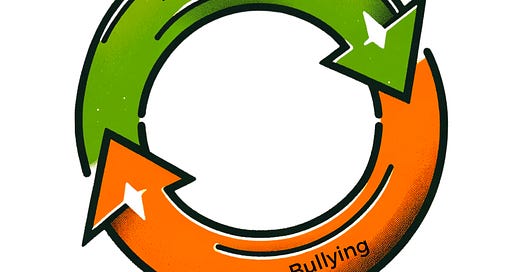Here's an uncomfortable thought.
In relationships and organizations, bullying and niceness co-create each other and a toxic culture. Both contribute to the harm.
By bullying, I mean the use of force, coercion, threats, hurtful language, harassment, or teasing to dominate or intimidate, to be able to exercise power over others who are more vulnerable, including getting your way whether others have objections or not.
By niceness, I mean avoiding "rocking the boat" or "making waves," not speaking out, being docile. It can appear as "not getting involved" even when observing or experiencing hurt or harm. It can also appear as just walking away rather than making one's objections or disagreement explicit. (Niceness is not friendliness or kindness or collegiality.)
A goal of bullying is to keep someone from speaking up or raising issues by making doing so very risky. Bullying can provoke that flight or freeze reflex we all have, to avoid confrontation. Yet, avoidance and non-confrontation, letting the person who is bullying get what power they want, encourage the bullying behavior and make it even more likely it will happen.
The more one was bullied in childhood (in the family or at school), the more likely one will either practice bullying or practice avoidance via niceness.
How do you break the cycle? It is not always safe for the most vulnerable to object, so “bystanders” becoming “upstanders” is one path to ending the cycle — it confronts the bullying, and models different behavior for the practitioners of niceness.
And sometimes the vulnerable being targeted do have to stand up, if they value the relationship or the organization and do not want it to be overrun by the person who is bullying. One can become an upstander, recognizing that there are risks. There are of course times when the risk is not acceptable. Leaving protects you, it does not change the situation except for you. And that may be the best boundary you can set.
Building allies and networks of support make it more possible for those who are targeted to become upstanders.
Occasionally, I have seen those with bullying behavior rethink their behavior. It would be a more wonderful world if more did so. Unfortunately, the ability to use bullying to effectively get one’s way means that few who bully see the advantage of changing the cycle, without upstanders who were either targets or bystanders.
If you’re in this situation, consider what are some beginning ways you can try “upstanding” in ways that minimize risk, and begin to chip away at the vicious cycle.
Photo 161346342 | Bullying © Prazis | Dreamstime.com





